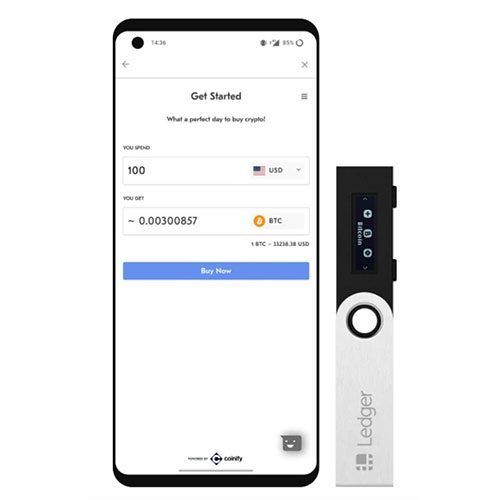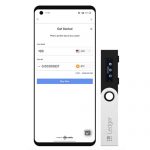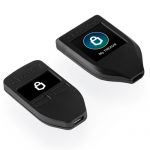Beginner’s Guide to Crypto Hardware Wallets
This is a beginner’s guide to cryptocurrency hardware wallets.
Are you holding crypto? Or looking to start investing?
In either case, you need cold storage to keep your funds secure – that’s where a hardware wallet comes into play.
In this article, we explore the benefits of using a cryptocurrency hardware wallet as well as what makes them different from other types of wallets.
- What is a cryptocurrency wallet?
- What is a crypto hardware wallet and what does it do?
- Why do you need a hardware wallet?
- How do you use a crypto hardware wallet?
- How do hardware wallets work?
- What happens if you lose your wallet device?
- What is the best hardware wallet to buy?
- Most popular hardware wallets
What is a cryptocurrency wallet?
In a nutshell, a crypto wallet stores your private keys which gives you access to your crypto assets on a blockchain.
It could be for Bitcoin, Ethereum, Avalanche or any other chain.
Without a wallet, there’s no way for you to transact on the blockchain.
That means you need it for doing things like collecting NFTs, buying and holding crypto, swapping for other tokens, and things like staking to make passive income.
Cryptocurrency wallets typically come in two different flavors: cold or hot wallets.
It is important to understand the pros and cons of each type of wallet before making your investment decision.
For now, we’ll focus on what a cold wallet is and more specifically, a hardware wallet.
What is a crypto hardware wallet and what does it do?
Crypto hardware wallets are arguably the safest way to store your cryptocurrencies.
A cryptocurrency hardware wallet is a special type of storage designed to securely store cryptocurrency offline.
The hardware wallet is a physical device that connects via a USB port (some have bluetooth capability) and stores the user’s private keys offline.
This reduces the chance of theft from hackers, risk from physical damage or loss, and natural disasters.
If you want to participate in crypto, you need a cryptocurrency wallet. A hardware wallet is a physical device that securely stores your private keys. These keys are what give you access to your crypto on a blockchain network.
Anyone that has your keys can control your crypto.
Plain and simple: you HAVE to protect your private keys.
Hardware wallets help you do just that.
The main idea with using a hardware wallet (or another form of cold storage) is to create separation between your private keys and your computer/internet.
By doing this, you add a strong layer of security.
In the event that a hacker compromises your computer or you accidentally click a malicious link, access to your funds will be protected by the physical hardware device. Because the device is disconnected from the internet, it is considered a cold wallet.
Why do you need a hardware wallet?
Technically, you don’t NEED a hardware wallet.
Many crypto exchanges like Coinbase function as a wallet to store your funds. These wallets are considered “hot wallets” as they are connected to the internet. The downside to hot wallets is that they are susceptible to attacks because they are connected to the internet.
For most people starting out, you’re probably looking to buy and hold coins on a platform like Coinbase. In this case, you’re probably fine as Coinbase is quite secure.
However, if you plan to move your tokens to another wallet, participate in DeFi projects or protocols on various blockchains, you should definitely invest in a hardware wallet.
Without one, you’re exposing yourself to a lot of unnecessary risk. One careless mistake could cost you everything.
Instead, use a hard wallet which is the best way to ensure your personal assets stay safe, even if your laptop isn’t secure. Cold storage wallets are designed to protect your crypto assets from hackers and scammers and phishing sites.
Lots of users on Discord complain about their account getting “hacked”.
But often times, this is actually due to user error. Fake phishing websites are a common way for people to get their funds stolen. Learn more about common crypto scams and how to avoid them here.
What happens is a hacker or scammer creates a fake website that mimics a DeFi project website. These fake sites can look super legit and can easily fool you if you’re not careful.
Now this fake site will ask you to connect your wallet to transact with it. If you’re using a hot wallet like MetaMask (software wallet as an extension for the chrome browser), a popup will then ask if you would like to connect your wallet. The second you approve it, the scammer now has full access to your wallet and can instantly drain your funds.
This would not have happened if you had a hard wallet.
In the world of crypto where you’re essentially acting as your own bank, there’s no customer support line to call if you get scammed and lose all your coins. There is no recourse so you have to take security of your crypto seriously.
Still not convinced why you need a hardware wallet?
Just take three minutes to watch this mind-blowing video segment on how easily your wallet can be drained. This video demonstrates how someone can steal your funds in a few seconds once they get ahold of your seed phrase.
How do you use a crypto hardware wallet?
Most hardware wallets are available as a tiny USB-drive or tiny, plug-in device. They can connect to your phone or computer by USB. Some can also connect using Bluetooth.
Whenever you connect to a dApp or transact on a blockchain, you have to sign or approve the transaction. To do this, you physically press a button on the hardware device to make the approval. Because your hardware device stores your private key, it gives proper authorization.
It is impossible for a hacker to sign a transaction on your behalf because access to your keys requires the physical device.
Starting to see why a hardware wallet is a good idea?
How do hardware wallets work?
So what is actually on the hardware wallet? Are your cryptos really on there?
Your crypto is not actually stored inside the physical wallet. Instead, crypto exists entirely on the blockchain network. A hardware wallet simply holds your private keys for you.
Since the blockchain lives on the internet and is accessible from anywhere with an internet connection, you just need your wallet and therefore, your private keys to access your tokens.
Private keys will also never leave your wallet. Your wallet serves as another layer in the validation process to sign transactions like sending tokens to another wallet, staking in a protocol or swapping tokens on an exchange.
What happens if you lose your wallet device?
Crypto tokens and assets can be recovered with a seed phrase (also known as a recovery phrase). This is a list of words in a specific order that is used to recreate your private key. As long as you have your seed phrase handy, you can always transfer your keys to another wallet and restore your funds.
Another great thing about a hardware wallet is that even if you lose it, your wallet is protected by a PIN. So if someone were to steal your device, they would still need to know your pin to access your private key that’s stored on it.
What is the best hardware wallet to buy?
The most popular hardware wallets are similar to a USB-stick, but they can also come in other forms of cold storage like a key fob.
Any good hardware wallet should be very secure in creating a layer of security between your computer, the internet, and your private keys. A good wallet should also support a wide range of digital assets including ERC-20 tokens (smart contracts on Ethereum) and NFTs.
Here are some of the most trusted devices for hardware wallets:
Ledger hardware wallet
Ledger Nano X and Ledger Nano S are the most well known and trusted hardware wallet devices. They are compact, light-weight devices and support over 1000 cryptocurrencies. Ledger wallets easily integrate with other wallet apps like MetaMask. This makes transfers and transactions between wallets easy. The Nano S is a very affordable hardware wallet. It uses a USB connection and has limited storage space. The Nano X is the more expensive option, uses Bluetooth connection and can store up to 18 third-party apps (one for each token).
The Ledger Nano S is what I personally use.
Shop Ledger Nano hardware wallets
Trezor hardware wallet
Trezor Model T has a touchscreen interface and supports over 1000 different cryptocurrencies including Bitcoin, Ethereum, and alt coins like Doge, XRP and ADA (Cardano). Model T does not use a battery or wireless connectivity. It’s a great option for added security with ease of use.
KeepKey cold storage
Unlike key fob or USB-stick hardware wallets, the KeepKey is considerably larger. It features a large, easy to read display. It stores both your public and private keys just as any other form of cold storage.
YubiKey cold storage
A YubiKey is a small USB device that works as an authentication device. It protects access to computers, networks, and online services that supports one-time passwords, and public-key cryptography. It is one of the cheapest security device options and is virtually indestructible.








